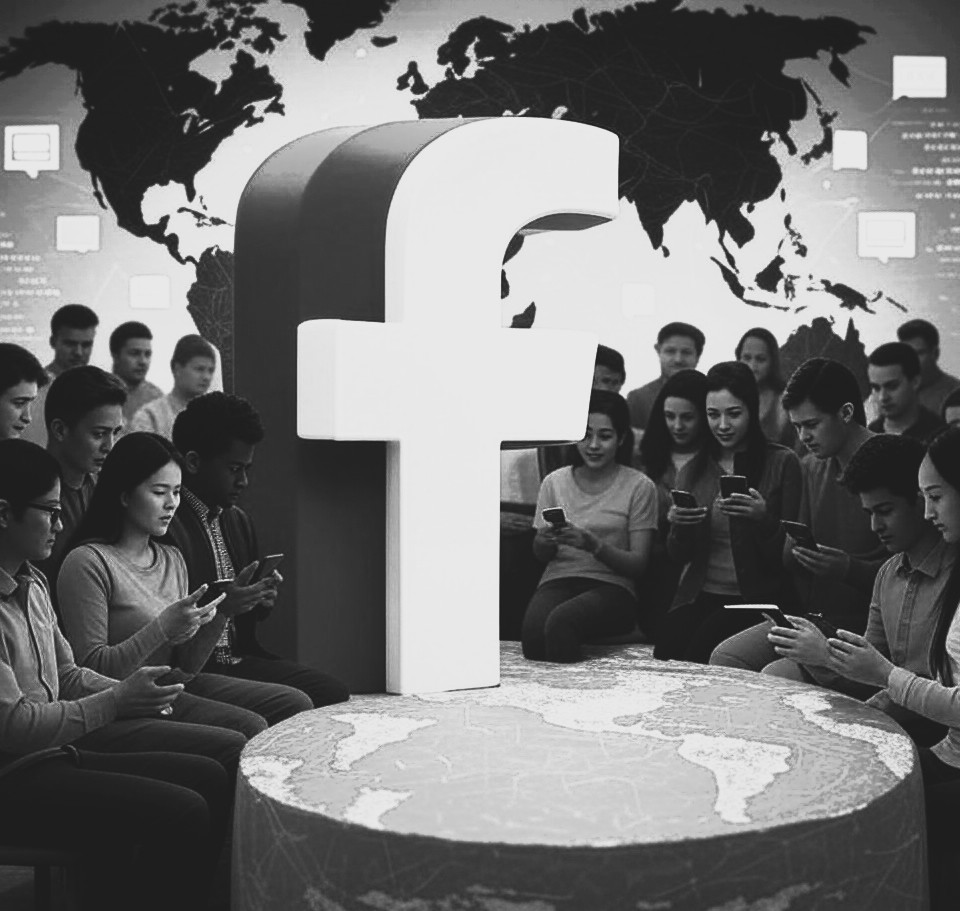Facebook has grown from a college networking site into a global behemoth since its inception in 2004, , shaping how people connect, share, and consume information. As of May 2025, with over 3 billion monthly active users, Facebook (now under the parent company Meta) remains the largest social media platform in the world. Its influence spans personal relationships, business marketing, political movements, and cultural trends, but it has also faced significant scrutiny over privacy, misinformation, and its societal impact. This article explores Facebook’s history, features, global reach, controversies, and future trajectory.
The Genesis of Facebook
Facebook was founded by Mark Zuckerberg, along with his Harvard roommates Eduardo Saverin, Andrew McCollum, Dustin Moskovitz, and Chris Hughes, in February 2004. Initially called “TheFacebook,” it was a platform for Harvard students to connect, share profiles, and network. The idea was inspired by Zuckerberg’s earlier project, Facemash, a site that let users rate the attractiveness of their peers. TheFacebook quickly expanded to other Ivy League schools, then to universities across the U.S., and by 2006, it was open to anyone over 13 with an email address.
The platform’s growth was exponential. By 2012, Facebook had 1 billion users, a milestone that underscored its global dominance. That same year, it went public with a $104 billion IPO, one of the largest in tech history. In 2012, Facebook also acquired Instagram, followed by WhatsApp in 2014 and Oculus in 2014, signaling its ambition to dominate social media, messaging, and virtual reality. In 2021, the company rebranded as Meta, reflecting its focus on the metaverse, though the Facebook platform retained its name.
Key Features of Facebook
Facebook’s evolution has been driven by its ability to adapt and introduce features that cater to diverse user needs. Here are some of its core and recent features as of May 2025:
- Timeline and News Feed:
- The News Feed, introduced in 2006, is the heart of Facebook, delivering a personalized stream of posts, photos, and videos from friends, pages, and groups. The algorithm prioritizes content based on user engagement, often sparking debates about echo chambers and bias.
- Groups and Communities:
- Facebook Groups allow users to join or create communities around shared interests, from parenting to gaming to local events. As of 2025, there are over 10 million active groups, with enhanced admin tools for moderation and monetization (e.g., paid memberships).
- Marketplace:
- Launched in 2016, Marketplace is a peer-to-peer buying and selling platform, competing with sites like Craigslist and eBay. Users can list items, from furniture to cars, and connect with local buyers.
- Facebook Watch:
- Introduced in 2017, Facebook Watch offers original video content, live streams, and user-generated videos, competing with YouTube and Netflix. By 2025, Watch has expanded into short-form content and interactive live shows.
- Stories:
- Borrowed from Snapchat in 2017, Stories allow users to share ephemeral photos and videos that disappear after 24 hours. This feature integrates with Instagram, boosting cross-platform engagement.
- Messenger:
- Facebook Messenger, spun off as a standalone app in 2014, supports text, voice, and video calls, with end-to-end encryption for private chats (fully rolled out by 2023). It also offers business tools like chatbots and payment integration in select regions.
- Events and Check-Ins:
- Users can create, discover, and RSVP to events, from local meetups to global conferences. The Check-In feature lets users share their location at venues, enhancing social discovery.
- Facebook Dating:
- Launched in 2019, Facebook Dating integrates with user profiles to match people based on preferences, interests, and mutual friends. By 2025, it includes video date features and AI-driven compatibility suggestions.
- Reels:
- Introduced in 2020 to compete with TikTok, Reels allows users to create and share short-form videos with music, filters, and effects. Reels has become a major growth driver, especially among younger users.
- Meta AI and Metaverse Integration:
- By 2025, Facebook integrates Meta AI for smarter recommendations, content moderation, and chatbot interactions. The platform also offers early metaverse features, like Horizon Worlds, where users can interact in virtual spaces using VR headsets.
- Business Tools:
- Facebook Pages, Ads Manager, and Business Suite enable brands to create profiles, run targeted ads, and analyze performance. Features like Shops (launched in 2020) allow businesses to set up online stores directly on the platform.
Global Reach and Impact
Facebook’s 3 billion users span every continent, with significant penetration in North America, Europe, India (over 400 million users), Brazil, and Indonesia. Its accessibility in over 100 languages and support for low-bandwidth devices (via Facebook Lite) has made it a staple in both developed and emerging markets.
Social Impact
Facebook has redefined how people maintain relationships, share life events, and build communities. It has been a lifeline for diaspora communities, enabling long-distance connections through Messenger and Groups. During crises, like natural disasters or pandemics, Facebook’s Safety Check feature has helped users confirm their safety and coordinate aid.
However, Facebook has also been blamed for exacerbating social polarization. Its algorithm, which prioritizes engagement, often amplifies divisive content, as seen during the 2016 U.S. election and the 2020 COVID-19 pandemic, where misinformation about vaccines spread rapidly.
Economic Impact
Facebook has transformed digital marketing, offering unparalleled ad-targeting capabilities through its vast user data. Small businesses use Pages and Marketplace to reach local customers, while global brands leverage Ads Manager for precision campaigns. In 2024, Meta reported $130 billion in ad revenue, with Facebook contributing the lion’s share.
The platform has also fostered entrepreneurship through creator tools. By 2025, Facebook’s Creator Studio supports monetization via ads, subscriptions, and fan donations, empowering influencers and content creators.
Political and Cultural Influence
Facebook has been a double-edged sword in politics. It has enabled grassroots movements, like the Arab Spring in 2011, but also facilitated election interference, as seen with the 2016 Cambridge Analytica scandal, where user data was misused to influence voters. The platform’s role in spreading fake news has led to global calls for regulation, with the EU and U.S. implementing stricter oversight by 2025.
Culturally, Facebook has shaped trends through viral content, memes, and Reels. It has also been a platform for social activism, with movements like #MeToo and #BlackLivesMatter gaining momentum through its network.
Privacy and Controversies
Facebook’s history is marred by controversies that have tested its reputation:
- Cambridge Analytica (2018): The scandal revealed that the political consulting firm harvested data from 87 million users without consent, using it for targeted political ads. This led to a $5 billion fine from the U.S. FTC and global backlash.
- Privacy Concerns: Facebook’s business model relies on user data for ads, raising concerns about surveillance. In 2021, Apple’s iOS 14.5 update introduced App Tracking Transparency, allowing users to opt out of tracking, which cost Meta an estimated $10 billion in ad revenue in 2022.
- Misinformation and Hate Speech: Facebook has struggled to curb misinformation, especially during elections and the COVID-19 pandemic. In 2021, whistleblower Frances Haugen leaked internal documents showing the company prioritized growth over safety, fueling calls for reform.
- Antitrust Scrutiny: By 2025, Meta faces ongoing antitrust lawsuits in the U.S. and EU, with regulators accusing it of monopolistic practices through acquisitions like Instagram and WhatsApp. Some advocate for breaking up the company.
- Mental Health and Youth: Studies, including Meta’s own research leaked in 2021, have linked Facebook and Instagram to negative mental health effects among teens, such as anxiety and body image issues. In response, Meta has introduced features like “Take a Break” reminders and enhanced parental controls by 2025.
To address these issues, Facebook has invested in AI-driven content moderation, hired thousands of moderators, and rolled out privacy tools like Off-Facebook Activity tracking and enhanced data controls.
Facebook and Meta’s Ecosystem
Under Meta, Facebook integrates with Instagram, WhatsApp, and Oculus, creating a cohesive ecosystem. Businesses can sync ads and catalogs across platforms, while users can share content seamlessly (e.g., posting Instagram Stories to Facebook). Messenger and WhatsApp are being integrated for cross-app messaging, though full rollout is still in progress as of 2025.
Meta’s push into the metaverse has also influenced Facebook. Horizon Worlds, a VR platform, lets users attend virtual events, play games, and socialize. By 2025, Facebook offers early AR features, like filters for Reels, and VR integration for Groups and Events, aligning with Meta’s vision of a 3D internet.
The Future of Facebook
As Facebook navigates a complex landscape, several trends are shaping its future:
- Metaverse Expansion:
- Meta is investing heavily in the metaverse, with Facebook as a gateway. By 2030, Zuckerberg envisions billions using VR/AR to work, socialize, and shop on the platform, though adoption remains slow in 2025 due to high VR headset costs.
- AI and Personalization:
- Meta AI will enhance content recommendations, ad targeting, and user experiences, such as real-time translation for global Groups or automated event planning.
- Creator Economy:
- Facebook aims to compete with TikTok and YouTube by expanding Reels monetization and introducing NFT integration for creators to sell digital art.
- Privacy and Regulation:
- Facing global regulations like the EU’s Digital Services Act, Facebook may adopt decentralized data storage or federated models to comply while maintaining user trust.
- Emerging Markets:
- With saturation in Western markets, Facebook is focusing on Africa and Asia, expanding Facebook Lite and introducing low-data features to capture the next billion users.
- Sustainability:
- Meta has pledged carbon neutrality by 2030, and Facebook is optimizing its data centers and algorithms to reduce energy consumption.
Conclusion
Facebook’s journey from a dorm-room project to a global powerhouse reflects its ability to innovate and adapt. It has connected billions, empowered businesses, and shaped cultural narratives, but its dominance comes with responsibility. Privacy scandals, misinformation, and regulatory pressures have forced Facebook to evolve, balancing growth with ethical governance.
As it embraces the metaverse and AI, Facebook remains a pivotal force in the digital age. Whether it can maintain its relevance while addressing its challenges will determine its legacy in a world increasingly defined by technology and connectivity.















Leave a Reply